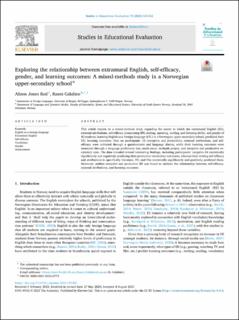Exploring the relationship between extramural English, self-efficacy, gender, and learning outcomes: A mixed-methods study in a Norwegian upper-secondary school
Peer reviewed, Journal article
Published version
Permanent lenke
https://hdl.handle.net/11250/3085837Utgivelsesdato
2023Metadata
Vis full innførselSamlinger
Originalversjon
Rød, A. J. & Calafato, R. (2023). Exploring the relationship between extramural English, self-efficacy, gender, and learning outcomes: A mixed-methods study in a Norwegian upper-secondary school. Studies in Educational Evaluation, 79, Artikkel 101302. https://doi.org/10.1016/j.stueduc.2023.101302Sammendrag
This article reports on a mixed-methods study regarding the extent to which the extramural English (EE), external attributions, self-efficacy (concerning EFL reading, speaking, writing, and listening skills), and gender of 42 students, learning English as a foreign language (EFL) in a Norwegian upper-secondary school, predicted their EFL learning outcomes. Data on participants’ EE (receptive and productive), external attributions, and self-efficacy were collected through a questionnaire and language diaries, while their learning outcomes were measured through a language proficiency test, mock exam, in-depth project, and receptive and productive vocabulary tests. The data revealed several interesting findings, including participants’ receptive EE statistically significantly and negatively predicting their productive vocabulary test scores, whereas their writing self-efficacy and attributions to specifically literature, TV, and film statistically significantly and positively predicted them. Moreover, neither receptive nor productive EE was found to mediate the relationship between self-efficacy, external attributions, and learning outcomes.

